Basics of Wheeling
+4
CrawlingForward
desertzj
Jake
Ryan McKee
8 posters
Page 1 of 1
 Basics of Wheeling
Basics of Wheeling
So! Welcome to North Shore Jeeps. You've gotten a feel for the club, met a few of the members online, and are now interested in taking your Jeep on a club run with us. Excitement is usually the main feeling, but people are commonly left with a little bit of wonder as to whether or not they're ready to actually hit the trails, and what they should expect.
Here is what we post in the announcement of each run:
Requirements:
- 31" tires
- Working 4wd
- Tow points at the front and rear of the vehicle
- Full size spare tire
- CB Radio
Highly Recommended:
- Winch
- SKID PLATES!
- Tow strap (Not straps with hooks at the end)
- Tool kits/sockets/etc
- First aid kit
- Fire Extinguisher
The most important things to wheeling in a group (and always wheel in a group! NEVER alone!) is that you carry a few things to keep yourself going in the event of a most common problem. The first on this list is a full-size spare tire. If you pop a bead, or in any way get a flat, you've got to have the right stuff to get yourself going again. We're a club, and a community, so obviously we're here to help... but it's important you have your own tire. People aren't all that likely to want to volunteer their tires due to your problem of having a flat. It should also be noted these tires need to match in size, otherwise you can severely damage the axles and transfer case. This is also the time to note that the $80 investment in a Hi-Lift jack is worth it's weight in gold while on the trail. Sometimes you'll need to change out a flat in the middle of nowhere in a situation where your Jeep-supplied bottle jack won't do the trick. Also, as the Jeeps get built up, it gets harder and slower to get them off the ground... Hi-Lifts change that very quickly.
Example of times to have a Hi-Lift:

Tow points are a requirement on the front and back, be it a shackle in your bumper or a tow hook that's bolted to the frame. In the event that you need to be pulled out of a hairy situation (believe me... if you have fun your first time out, you'll start pushing your own limits to see just how capable your jeep is.... sometimes this ends us in situations we can't get out of alone. At that point I direct you to the first thing on our "Highly Recommended" list - a winch. Winches allow you to recovery yourself, as well as to assist in the recovery of others. Even when there's no way to drive out of a situation under your own power, the winch can pull you out and get you back on your way. We have multiple threads open on what kinds of winches are best for the money, so perhaps it's time you consider one.
Example of times to have a winch:
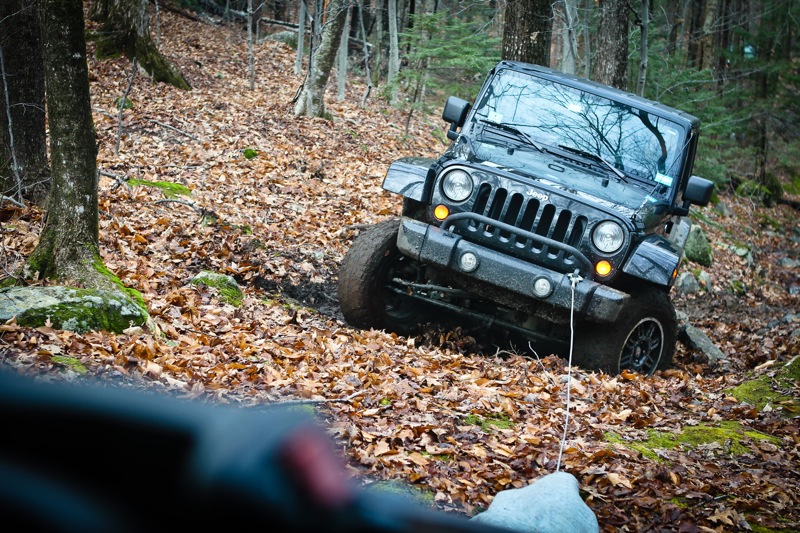
The last item on our "Required" list is one we're a little lenient on. A CB radio is the best form of communication on the trail. Having one allows you to call out to the group if you need anything (be it to stop and check on a noise, try an obstacle, even just take a bio break). It also keeps you personally in the loop about why the group may be stopping, or how we might be changing course of direction. When you don't have one, it actually makes our lives harder when leading a trip since we have to stop and physically walk to your Jeep to let you know what's happening. There have been events in the past where people have gone off the trail because the information was not clearly relayed to them due to the lack of a CB radio. We have a great thread about the Intros to CB Radios - https://northshorejeeps.forumotion.com/t126-trail-communications - if you're looking to buy one.
----
Further reading:
Aside the generic list of things to have (and the very important aforementioned things), I highly recommend having extra fluids. In the event that you snap a brake line, smash your differential cover into a rock, or puncture your radiator, you'll want to have extra fluids. I carry power steering fluid, brake fluid, ATF fluid for the transfer case, and a bit of coolant. These 4 things are usually enough to get you moving again in the event that something goes wrong. Keep in mind that older TJs and YJs have been exposed to a decade or even more of New England salt in the winter. Even brake lines you think are fine could be ready to bust with thin walled hard lines.
The other things that are worth bringing are materials to attach things to... be it a roll of paracord, steel/aluminum wire tie, zip-ties, electrical tape, regular rope, what have you. Things like these can be used to tie exhausts up, keep things tied down in the back, or any other miscellaneous tasks that might present themselves on the trail. Zip ties are asked for by someone at least once a trip so they can attach their sway bar disconnects up... have your own
It's important to have a few things in your bag-of-tools... we spend thousands of dollars on modifying the Jeeps for the better but we often forget the fundamentals of keeping ourselves safe once we're out there in the woods. Beyond the tow straps, tree-savers, extra D-ring shackles, gloves, etc (PLEASE spend the $150 and get all of this stuff. It can save you!) I also keep two tarps. For longer trips, invest in a small sleeping bag, blanket, and a hammock. Maybe even some dried food.
I realize that we're only ever going to be in New England. People seem so close by. But I assure you, from personal experience, that there are times you're miles and miles into the middle of the woods with no cell service, no CB reception to anyone aside the group you're with, and the sun starts setting. You need to be able to last a night in the woods in any conditions. This can even come in handy during winter storms or the rising likelihood of hurricanes we've been experiencing in the last few years.
----
Take home message:
The vehicles are capable of whatever we build them for. Don't forget to make yourself as capable as the Jeep you're driving.
If you have any questions, or want me to explain further anything, just ask. There's a wealth of information on here that we're all interested in sharing. So don't hesitate! We look forward to having you on the next club run!
Here is what we post in the announcement of each run:
Requirements:
- 31" tires
- Working 4wd
- Tow points at the front and rear of the vehicle
- Full size spare tire
- CB Radio
Highly Recommended:
- Winch
- SKID PLATES!
- Tow strap (Not straps with hooks at the end)
- Tool kits/sockets/etc
- First aid kit
- Fire Extinguisher
The most important things to wheeling in a group (and always wheel in a group! NEVER alone!) is that you carry a few things to keep yourself going in the event of a most common problem. The first on this list is a full-size spare tire. If you pop a bead, or in any way get a flat, you've got to have the right stuff to get yourself going again. We're a club, and a community, so obviously we're here to help... but it's important you have your own tire. People aren't all that likely to want to volunteer their tires due to your problem of having a flat. It should also be noted these tires need to match in size, otherwise you can severely damage the axles and transfer case. This is also the time to note that the $80 investment in a Hi-Lift jack is worth it's weight in gold while on the trail. Sometimes you'll need to change out a flat in the middle of nowhere in a situation where your Jeep-supplied bottle jack won't do the trick. Also, as the Jeeps get built up, it gets harder and slower to get them off the ground... Hi-Lifts change that very quickly.
Example of times to have a Hi-Lift:

Tow points are a requirement on the front and back, be it a shackle in your bumper or a tow hook that's bolted to the frame. In the event that you need to be pulled out of a hairy situation (believe me... if you have fun your first time out, you'll start pushing your own limits to see just how capable your jeep is.... sometimes this ends us in situations we can't get out of alone. At that point I direct you to the first thing on our "Highly Recommended" list - a winch. Winches allow you to recovery yourself, as well as to assist in the recovery of others. Even when there's no way to drive out of a situation under your own power, the winch can pull you out and get you back on your way. We have multiple threads open on what kinds of winches are best for the money, so perhaps it's time you consider one.
Example of times to have a winch:

The last item on our "Required" list is one we're a little lenient on. A CB radio is the best form of communication on the trail. Having one allows you to call out to the group if you need anything (be it to stop and check on a noise, try an obstacle, even just take a bio break). It also keeps you personally in the loop about why the group may be stopping, or how we might be changing course of direction. When you don't have one, it actually makes our lives harder when leading a trip since we have to stop and physically walk to your Jeep to let you know what's happening. There have been events in the past where people have gone off the trail because the information was not clearly relayed to them due to the lack of a CB radio. We have a great thread about the Intros to CB Radios - https://northshorejeeps.forumotion.com/t126-trail-communications - if you're looking to buy one.
----
Further reading:
Aside the generic list of things to have (and the very important aforementioned things), I highly recommend having extra fluids. In the event that you snap a brake line, smash your differential cover into a rock, or puncture your radiator, you'll want to have extra fluids. I carry power steering fluid, brake fluid, ATF fluid for the transfer case, and a bit of coolant. These 4 things are usually enough to get you moving again in the event that something goes wrong. Keep in mind that older TJs and YJs have been exposed to a decade or even more of New England salt in the winter. Even brake lines you think are fine could be ready to bust with thin walled hard lines.
The other things that are worth bringing are materials to attach things to... be it a roll of paracord, steel/aluminum wire tie, zip-ties, electrical tape, regular rope, what have you. Things like these can be used to tie exhausts up, keep things tied down in the back, or any other miscellaneous tasks that might present themselves on the trail. Zip ties are asked for by someone at least once a trip so they can attach their sway bar disconnects up... have your own
It's important to have a few things in your bag-of-tools... we spend thousands of dollars on modifying the Jeeps for the better but we often forget the fundamentals of keeping ourselves safe once we're out there in the woods. Beyond the tow straps, tree-savers, extra D-ring shackles, gloves, etc (PLEASE spend the $150 and get all of this stuff. It can save you!) I also keep two tarps. For longer trips, invest in a small sleeping bag, blanket, and a hammock. Maybe even some dried food.
I realize that we're only ever going to be in New England. People seem so close by. But I assure you, from personal experience, that there are times you're miles and miles into the middle of the woods with no cell service, no CB reception to anyone aside the group you're with, and the sun starts setting. You need to be able to last a night in the woods in any conditions. This can even come in handy during winter storms or the rising likelihood of hurricanes we've been experiencing in the last few years.
----
Take home message:
The vehicles are capable of whatever we build them for. Don't forget to make yourself as capable as the Jeep you're driving.
If you have any questions, or want me to explain further anything, just ask. There's a wealth of information on here that we're all interested in sharing. So don't hesitate! We look forward to having you on the next club run!
 Re: Basics of Wheeling
Re: Basics of Wheeling
Thanks for the writeup Ryan.
Running through what I have:
Requirements:
- 33" tires exceed the req
- 4wd works
- Tabs for shackles on my front bumper, have a hitch in the rear but need to pick up a shackle receiver for it
- Full size spare has some internal (???) sidewall damage and bulges slightly in one spot. No idea what the previous owner did to it but it seems ok as a backup
- Ordered a CB, still need to find an antenna and figure out how to mount it.
Recommended:
-Have a winch mount bumper but I'm not going to drop the cash on one before I've even been wheeling once, as much as I want to
-No skid plates.. yet
-No tow straps
-Basic socket set and tools that I keep in the Jeep
-No first aid kit
-No fire extinguisher
I do have chains that were leftover from a project but I've heard chains are bad from some people, while I've seen some promo videos for Hi-lift etc. that use chains.
My current to buy list is:
-Shackles
-Hitch mount shackle receiver
-Tow straps/tree saver
-CB antenna, antenna bracket
-Hi-lift?
Unfortunately a hi-lift isn't too useful on an xj without rock sliders because there aren't many lift points that you can safely reach with the jaw so I'm not sure whether to bother picking one up.
Does anyone have recommendations on brands for shackles and a hitch shackle receiver? Also brands for tow straps, quantity, length? Tree savers? Am I missing anything major? Does anyone else have further suggestions?
Thanks!
Running through what I have:
Requirements:
- 33" tires exceed the req
- 4wd works
- Tabs for shackles on my front bumper, have a hitch in the rear but need to pick up a shackle receiver for it
- Full size spare has some internal (???) sidewall damage and bulges slightly in one spot. No idea what the previous owner did to it but it seems ok as a backup
- Ordered a CB, still need to find an antenna and figure out how to mount it.
Recommended:
-Have a winch mount bumper but I'm not going to drop the cash on one before I've even been wheeling once, as much as I want to
-No skid plates.. yet
-No tow straps
-Basic socket set and tools that I keep in the Jeep
-No first aid kit
-No fire extinguisher
I do have chains that were leftover from a project but I've heard chains are bad from some people, while I've seen some promo videos for Hi-lift etc. that use chains.
My current to buy list is:
-Shackles
-Hitch mount shackle receiver
-Tow straps/tree saver
-CB antenna, antenna bracket
-Hi-lift?
Unfortunately a hi-lift isn't too useful on an xj without rock sliders because there aren't many lift points that you can safely reach with the jaw so I'm not sure whether to bother picking one up.
Does anyone have recommendations on brands for shackles and a hitch shackle receiver? Also brands for tow straps, quantity, length? Tree savers? Am I missing anything major? Does anyone else have further suggestions?
Thanks!
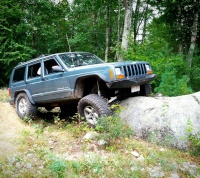
Jake- Rausch Creek
- Posts : 323
Join date : 2013-05-19
Location : Beverly
 Re: Basics of Wheeling
Re: Basics of Wheeling
hobhayward wrote:
Running through what I have:
Thanks!
You don't need a winch to run with us. You don't need skids, a first aid kit, or a fire extinguisher. Chains are off limits. you don't need a hi-lift. Do keep in mind these are suggestions of handy things to have. Shackle receivers are available from Crown Automotive (Canton!) and even Harbor Freight. Also eBay.
 Re: Basics of Wheeling
Re: Basics of Wheeling
hobhayward wrote:Thanks for the writeup Ryan.
Running through what I have:
Requirements:
- 33" tires exceed the req
- 4wd works
- Tabs for shackles on my front bumper, have a hitch in the rear but need to pick up a shackle receiver for it
- Full size spare has some internal (???) sidewall damage and bulges slightly in one spot. No idea what the previous owner did to it but it seems ok as a backup
- Ordered a CB, still need to find an antenna and figure out how to mount it.
Recommended:
-Have a winch mount bumper but I'm not going to drop the cash on one before I've even been wheeling once, as much as I want to
-No skid plates.. yet
-No tow straps
-Basic socket set and tools that I keep in the Jeep
-No first aid kit
-No fire extinguisher
I do have chains that were leftover from a project but I've heard chains are bad from some people, while I've seen some promo videos for Hi-lift etc. that use chains.
My current to buy list is:
-Shackles
-Hitch mount shackle receiver
-Tow straps/tree saver
-CB antenna, antenna bracket
-Hi-lift?
Unfortunately a hi-lift isn't too useful on an xj without rock sliders because there aren't many lift points that you can safely reach with the jaw so I'm not sure whether to bother picking one up.
Does anyone have recommendations on brands for shackles and a hitch shackle receiver? Also brands for tow straps, quantity, length? Tree savers? Am I missing anything major? Does anyone else have further suggestions?
Thanks!
Firestik antenna kit kit here, what I have on my ZJ (Ryan was one of the people who recommended it to me, love it) Don't do chains, when you get a tow strap, don't get one with metal hooks at the end, all nylon. Imagine one link breaks, or if its a metal hook on nylong tow strap, and it snaps. It's a deadly projectile. Mine's a smitty bilt, works just fine. I went thicker and longer just in case, and it adds extra strength. Arb makes some tow straps, heard good things about them, I just wasn't going to drop that much cash on it. I just grabbed a hitch mounted shackle set up from 4wheelparts (when I was in Arizona) and run it on the trails. Works well for me.
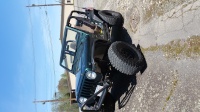
desertzj- Rausch Creek
- Posts : 311
Join date : 2013-04-29
Age : 33
Location : Norwood
 Re: Basics of Wheeling
Re: Basics of Wheeling
Other general points of wheeling:
- There should only be one spotter per vehicle on an obstacle. More than one gets confusing and can be dangers.
- Directions should be given in passenger/driver, not right/left. It's clearer that way.
- Airing down and 4WD is not just for ride comfort or X-treme terrain. It creates better, more distributed traction that means you tear up trails less and keep our trails open.
- For the same reason, stick only to designated trails
- Safety is #1 concern. Think twice, act once.
 Re: Basics of Wheeling
Re: Basics of Wheeling
Thanks for the suggestions guys.
CrawlingForward, thanks for bringing up airing down. What do people generally use to air-up after a run? I have one of those 12v mini compressors, but I have a feeling it wouldn't even be worth it, it was slow as hell with regular tires.
CrawlingForward, thanks for bringing up airing down. What do people generally use to air-up after a run? I have one of those 12v mini compressors, but I have a feeling it wouldn't even be worth it, it was slow as hell with regular tires.

Jake- Rausch Creek
- Posts : 323
Join date : 2013-05-19
Location : Beverly
 Re: Basics of Wheeling
Re: Basics of Wheeling
hobhayward wrote:What do people generally use to air-up after a run? I have one of those 12v mini compressors, but I have a feeling it wouldn't even be worth it, it was slow as hell with regular tires.
Ha ha, I use a 12v one too and I think it's *fine*, but everyone else in the group rolls their eyes and makes me drive to an actual gas station so I don't take all night to air back up, ha ha.

 Re: Basics of Wheeling
Re: Basics of Wheeling
Slow is better than no!, A small compressor takes a bit of time but better than nothing...
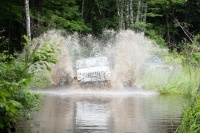
Mark- Rubicon Trail
- Posts : 1300
Join date : 2011-12-10
Location : Haverhill, MA
 Re: Basics of Wheeling
Re: Basics of Wheeling
I use one of these:
http://www.amazon.com/Industries-MV50-SuperFlow-High-Volume-Compressor/dp/B000BM8RT8
Works pretty well. Gets hot after the 4 tires so let it rest if going to air up someone elses rig.
http://www.amazon.com/Industries-MV50-SuperFlow-High-Volume-Compressor/dp/B000BM8RT8
Works pretty well. Gets hot after the 4 tires so let it rest if going to air up someone elses rig.
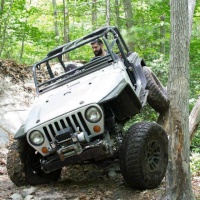
janesy- Rausch Creek
- Posts : 330
Join date : 2012-04-03
Age : 38
Location : Beverly, MA
 Re: Basics of Wheeling
Re: Basics of Wheeling
CB radio is installed. Antenna, coax, antenna mount and shackle receiver are in the mail.
Does anyone have recommendations on shackles? I've seen a lot of mixed opinions on what to get, some say the cheapo ones are fine as long as they have a WLL stamp, others say stick to quality brands like Campbell. Some people also say only get shackles that are the same size as the mount holes you have for them (mine are 1" diam). I'm thinking about just picking up a single high quality one that's the correct size because the larger made in USA ones are pretty pricey. I also don't plan on leaving them mounted on the bumper where they can be stolen so looks aren't a concern. That being said it's always nice to have a backup, but you shouldn't ever need more than one unless you're running a snatch block with a winch for self recovery?
Thanks guys
Does anyone have recommendations on shackles? I've seen a lot of mixed opinions on what to get, some say the cheapo ones are fine as long as they have a WLL stamp, others say stick to quality brands like Campbell. Some people also say only get shackles that are the same size as the mount holes you have for them (mine are 1" diam). I'm thinking about just picking up a single high quality one that's the correct size because the larger made in USA ones are pretty pricey. I also don't plan on leaving them mounted on the bumper where they can be stolen so looks aren't a concern. That being said it's always nice to have a backup, but you shouldn't ever need more than one unless you're running a snatch block with a winch for self recovery?
Thanks guys

Jake- Rausch Creek
- Posts : 323
Join date : 2013-05-19
Location : Beverly
 Re: Basics of Wheeling
Re: Basics of Wheeling
3 1/2 to 4 1/2 ton shackles will do, brand should not matter.
Get more than one, or a least a minimum of 2.
If you need to hook up a snatch block then you may need more than one.
Get more than one, or a least a minimum of 2.
If you need to hook up a snatch block then you may need more than one.

Mark- Rubicon Trail
- Posts : 1300
Join date : 2011-12-10
Location : Haverhill, MA
 Re: Basics of Wheeling
Re: Basics of Wheeling
If you want to sacrifice your AC compressor,
you could always do this.
https://northshorejeeps.forumotion.com/t74-kilotango-s-onboard-air-from-stock-05-tj-air-conditioning-compressor
It can fill a 35" tire from flat in about a minute and a half with this setup and it runs my IR impact wrench quite nicely.
A note about spares
Don't forget spares like a spare U-joint for the driveshaft and one for the front axle.
I always travel with one of each because you never know.
A 3/4 " rubber stopper will come in handy the day you rip out your oil plug if you don't have an engine skid that covers your oil pan. I saw it happen once. The very next day I went to the hardware store and bought one.
I keep JB Weld in my trail box too.
you could always do this.
https://northshorejeeps.forumotion.com/t74-kilotango-s-onboard-air-from-stock-05-tj-air-conditioning-compressor
It can fill a 35" tire from flat in about a minute and a half with this setup and it runs my IR impact wrench quite nicely.
A note about spares
Don't forget spares like a spare U-joint for the driveshaft and one for the front axle.
I always travel with one of each because you never know.
A 3/4 " rubber stopper will come in handy the day you rip out your oil plug if you don't have an engine skid that covers your oil pan. I saw it happen once. The very next day I went to the hardware store and bought one.
I keep JB Weld in my trail box too.
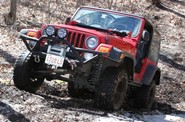
KiloTango- Daily Driver
- Posts : 41
Join date : 2012-01-29
Age : 67
Location : Rowley, MA
 Re: Basics of Wheeling
Re: Basics of Wheeling
desertzj wrote:hobhayward wrote:Thanks for the writeup Ryan.
Running through what I have:
Requirements:
- 33" tires exceed the req
- 4wd works
- Tabs for shackles on my front bumper, have a hitch in the rear but need to pick up a shackle receiver for it
- Full size spare has some internal (???) sidewall damage and bulges slightly in one spot. No idea what the previous owner did to it but it seems ok as a backup
- Ordered a CB, still need to find an antenna and figure out how to mount it.
Recommended:
-Have a winch mount bumper but I'm not going to drop the cash on one before I've even been wheeling once, as much as I want to
-No skid plates.. yet
-No tow straps
-Basic socket set and tools that I keep in the Jeep
-No first aid kit
-No fire extinguisher
I do have chains that were leftover from a project but I've heard chains are bad from some people, while I've seen some promo videos for Hi-lift etc. that use chains.
My current to buy list is:
-Shackles
-Hitch mount shackle receiver
-Tow straps/tree saver
-CB antenna, antenna bracket
-Hi-lift?
Unfortunately a hi-lift isn't too useful on an xj without rock sliders because there aren't many lift points that you can safely reach with the jaw so I'm not sure whether to bother picking one up.
Does anyone have recommendations on brands for shackles and a hitch shackle receiver? Also brands for tow straps, quantity, length? Tree savers? Am I missing anything major? Does anyone else have further suggestions?
Thanks!
Firestik antenna kit kit here, what I have on my ZJ (Ryan was one of the people who recommended it to me, love it) Don't do chains, when you get a tow strap, don't get one with metal hooks at the end, all nylon. Imagine one link breaks, or if its a metal hook on nylong tow strap, and it snaps. It's a deadly projectile. Mine's a smitty bilt, works just fine. I went thicker and longer just in case, and it adds extra strength. Arb makes some tow straps, heard good things about them, I just wasn't going to drop that much cash on it. I just grabbed a hitch mounted shackle set up from 4wheelparts (when I was in Arizona) and run it on the trails. Works well for me.
Which smittybilt did you get? I'm looking on quadratec and it seems like there's quite a few options and even the weakest one handles 5x my vehicle weight. What sort of rating and thickness are we looking for? Thanks!

cmartyj93- Daily Driver
- Posts : 31
Join date : 2016-03-15
Age : 46
Location : Nahant
 Similar topics
Similar topics» Wheeling Dates
» Another wheeling park in MAINE ?
» weekend snow wheeling
» August Wheeling Weekend Runs
» Wheeling Etiquette & Safety Comments
» Another wheeling park in MAINE ?
» weekend snow wheeling
» August Wheeling Weekend Runs
» Wheeling Etiquette & Safety Comments
Page 1 of 1
Permissions in this forum:
You cannot reply to topics in this forum|
|
|

 Home
Home